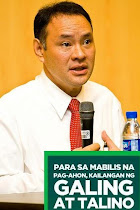(Content provided for by Aaron Benedict De Leon- Youth Spokesperson of GT, Vice President for Corporate Communications-Green Team National Board)
There is now widespread agreement amongst both scientists and politicians that global climate change is underway. Such a process is seen as a threat to humanity as it may lead to more extreme weather events, such as hurricanes, droughts and floods.
Here in the Philippines, climate change destroyed not merely buildings, homes, belongings and all other tangibles, but also changed the protocol in disaster risk management. Not only did it expose our topographical frailties, but also our weak institutions and the lack of a clear and substantial program to prepare our countrymen for these situations.
The environment, overall, is a responsibility of all sectors of society, but our institutions, again, should be strengthened so that emergency alarms, and a calibrated response system will trickle down to the citizenry.
INSTITUTIONAL REFORM
• Grassroots approach- LGU’s at the Forefront of Disaster Risk Management
Our current setup, which has the National Disaster Coordinating Council, the official civic arm of the Armed Forces of the Philippines, is the spearhead organization in terms of preparation, mitigation and rehabilitation efforts with respect to disasters. However, several bureaucracies do exist under its wing, and usually, the lowest amongst them are always awaiting signals from the main structure for action.
During the typhoons Ondoy and Peping, this rather unresponsive system cost many Filipino’s their lives and their homes. What must be done to fasten the process of rescue? We must put the power to Local Government Units to be the main agents for rescue, since their topography supports swift rescue response from an institutional standpoint. They have a better understanding for the needs of their localities; therefore they must have more access to resources for rescue and relief operations.
We must allow them to have more than the 5% of their IRA, the current maximum an LGU can utilize during disaster situations, so that they can purchase more logistics in terms of rubber boats, trucks and all other live-support and life-saving mechanisms.
Given this setup, what the National Council can do is to intervene whenever localities lack a certain number of logistical requirements, by having sufficient number of capital technology available to deploy, through their Regional/Provincial Disaster Councils.
This mechanism gives more power to the grassroots level to decide based on the urgency of the situation. The National Council must also allow regional and provincial councils to craft a CALIBRATED RESPONSE system based on the topographical characteristics of their area, so that alarms can easily be handed out, without delay, towards their respective localities.
• Nationalistic Approach- A National Department for Disasters as a tool for better preparation
In the current setup of the National Disaster Coordinating Council, operating under the function of the office of civil defense, receives 0.16% of the Defense Department’s budget or roughly around 92 million pesos. This is not enough considering that disasters pertain not only to typhoons, but also to earthquakes, and other environmental phenomena, adding to that fact that the country experiences multiple typhoons in a year. In addition to that, the Defense Department’s current setup does not allow for total concentration on disaster risk management because it also has other major functions under its wing.
Given the status quo, we are not prepared for even bigger disasters lying ahead of us in the coming years. That is why there is a need for the National Government to put up a Disaster Risk Management Department which could independently cater to preparation, mitigation, response and rehabilitation in terms of natural disasters, which will also be given the capacity to have more available appropriation. This will increase the chances for our country to be more prepared for upcoming environmental hazards.
• Private Investment: Support Greener Initiatives
The cost of reducing carbon emissions may take some time, due to current problems being encountered to reach a consensus at the Copenhagen talks regarding climate change, so the government must support all motives aimed at saving the environment from further degradation.
One of which is to continuously support campaigns by private companies towards protecting the environment through their earth-friendly initiatives (paperless environment, imposition of earth bags for packing etc.) through incentives (either tax-friendly or subsidies). As they say in economics, people respond to incentives.
SUSTAINABLE ANTI-CLIMATE CHANGE INFRASTRUCTURE
We also realized that certain areas in the country like Marikina, Rizal and portions of Pasig are vulnerable to flooding given a certain amount of rainfall at a specific time. This can be caused by several factors, due to flood ways and dams releasing big water, and so and so, but we must invest in capital technology, by means of putting up a sustainable anti-climate change infrastructure, which will support the existing topographies of localities where these would be built.
Government needs to undertake careful Urban Planning in areas which are readily affected by typhoons, and create a system that would channel amounts of water to certain areas which are considered to be high, or will cause minimal to no effect to another area. We have to re-channel water levels to certain areas so that we can free up some space for areas heavily affected by flooding, to either allow them time to evacuate or be less affected during the height of disasters.
DISASTER EDUCATION
We must also engage our citizens to be active participants during times of disaster. Our local government units, through our barangays, must be given the capacity to conduct trainings, not only during typhoons, but also in fire and earthquake situations, so that its people will be more ready to combat these negative turnabouts.
We must also institutionalize a system in school which will train students regarding specific alarms when water levels are rising, and to promote a clean and green environment through responsible waste management and simple garbage management, because we have to invest in the knowledge of children for the future, and basic environmental knowledge should be fundamental in our educational system.
There is now widespread agreement amongst both scientists and politicians that global climate change is underway. Such a process is seen as a threat to humanity as it may lead to more extreme weather events, such as hurricanes, droughts and floods.
Here in the Philippines, climate change destroyed not merely buildings, homes, belongings and all other tangibles, but also changed the protocol in disaster risk management. Not only did it expose our topographical frailties, but also our weak institutions and the lack of a clear and substantial program to prepare our countrymen for these situations.
The environment, overall, is a responsibility of all sectors of society, but our institutions, again, should be strengthened so that emergency alarms, and a calibrated response system will trickle down to the citizenry.
INSTITUTIONAL REFORM
• Grassroots approach- LGU’s at the Forefront of Disaster Risk Management
Our current setup, which has the National Disaster Coordinating Council, the official civic arm of the Armed Forces of the Philippines, is the spearhead organization in terms of preparation, mitigation and rehabilitation efforts with respect to disasters. However, several bureaucracies do exist under its wing, and usually, the lowest amongst them are always awaiting signals from the main structure for action.
During the typhoons Ondoy and Peping, this rather unresponsive system cost many Filipino’s their lives and their homes. What must be done to fasten the process of rescue? We must put the power to Local Government Units to be the main agents for rescue, since their topography supports swift rescue response from an institutional standpoint. They have a better understanding for the needs of their localities; therefore they must have more access to resources for rescue and relief operations.
We must allow them to have more than the 5% of their IRA, the current maximum an LGU can utilize during disaster situations, so that they can purchase more logistics in terms of rubber boats, trucks and all other live-support and life-saving mechanisms.
Given this setup, what the National Council can do is to intervene whenever localities lack a certain number of logistical requirements, by having sufficient number of capital technology available to deploy, through their Regional/Provincial Disaster Councils.
This mechanism gives more power to the grassroots level to decide based on the urgency of the situation. The National Council must also allow regional and provincial councils to craft a CALIBRATED RESPONSE system based on the topographical characteristics of their area, so that alarms can easily be handed out, without delay, towards their respective localities.
• Nationalistic Approach- A National Department for Disasters as a tool for better preparation
In the current setup of the National Disaster Coordinating Council, operating under the function of the office of civil defense, receives 0.16% of the Defense Department’s budget or roughly around 92 million pesos. This is not enough considering that disasters pertain not only to typhoons, but also to earthquakes, and other environmental phenomena, adding to that fact that the country experiences multiple typhoons in a year. In addition to that, the Defense Department’s current setup does not allow for total concentration on disaster risk management because it also has other major functions under its wing.
Given the status quo, we are not prepared for even bigger disasters lying ahead of us in the coming years. That is why there is a need for the National Government to put up a Disaster Risk Management Department which could independently cater to preparation, mitigation, response and rehabilitation in terms of natural disasters, which will also be given the capacity to have more available appropriation. This will increase the chances for our country to be more prepared for upcoming environmental hazards.
• Private Investment: Support Greener Initiatives
The cost of reducing carbon emissions may take some time, due to current problems being encountered to reach a consensus at the Copenhagen talks regarding climate change, so the government must support all motives aimed at saving the environment from further degradation.
One of which is to continuously support campaigns by private companies towards protecting the environment through their earth-friendly initiatives (paperless environment, imposition of earth bags for packing etc.) through incentives (either tax-friendly or subsidies). As they say in economics, people respond to incentives.
SUSTAINABLE ANTI-CLIMATE CHANGE INFRASTRUCTURE
We also realized that certain areas in the country like Marikina, Rizal and portions of Pasig are vulnerable to flooding given a certain amount of rainfall at a specific time. This can be caused by several factors, due to flood ways and dams releasing big water, and so and so, but we must invest in capital technology, by means of putting up a sustainable anti-climate change infrastructure, which will support the existing topographies of localities where these would be built.
Government needs to undertake careful Urban Planning in areas which are readily affected by typhoons, and create a system that would channel amounts of water to certain areas which are considered to be high, or will cause minimal to no effect to another area. We have to re-channel water levels to certain areas so that we can free up some space for areas heavily affected by flooding, to either allow them time to evacuate or be less affected during the height of disasters.
DISASTER EDUCATION
We must also engage our citizens to be active participants during times of disaster. Our local government units, through our barangays, must be given the capacity to conduct trainings, not only during typhoons, but also in fire and earthquake situations, so that its people will be more ready to combat these negative turnabouts.
We must also institutionalize a system in school which will train students regarding specific alarms when water levels are rising, and to promote a clean and green environment through responsible waste management and simple garbage management, because we have to invest in the knowledge of children for the future, and basic environmental knowledge should be fundamental in our educational system.







0 comments:
Post a Comment